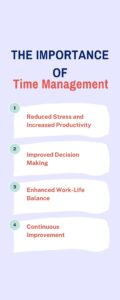Mastering Life’s Symphony:The Art of Time Management
Mastering Life’s Symphony: The Art of Time Management
Introduction:
In the grand orchestration of life, time stands as both conductor and composer. How we manage this invaluable resource dictates the harmonies and rhythms of our days. The art of time management isn’t merely about efficiency; it’s about crafting a symphony where each note, each moment, contributes to a harmonious, purposeful existence. Let’s explore the intricacies of this art form, uncovering strategies and insights to conduct life’s symphony with grace and balance.
Understanding Time Management:
Time management transcends calendars and schedules; it’s a mindset, a philosophy that empowers individuals to optimize their time for productivity, personal growth, and well-being. It involves prioritization, organization, and mindful utilization of the limited hours gifted to us each day.
Key Principles of Effective Time Management:
- Goal Setting and Prioritization:
- Begin by setting clear, achievable goals. Prioritize tasks aligned with these objectives, distinguishing between what’s important and what’s merely urgent.
- Planning and Organization:
- Organize your day, week, or month using planners, to-do lists, or digital tools. Allocate time blocks for specific tasks, ensuring a structured approach to your responsibilities.
- Task Delegation and Saying “No”:
- Recognize when to delegate tasks or say ‘no.’ Learning to decline non-essential commitments allows for better focus on critical priorities.
- Focus and Concentration:
- Practice single-tasking and deep work. Minimize distractions, hone concentration, and dedicate uninterrupted blocks of time to accomplish important tasks.
- Time Tracking and Analysis:
- Monitor how you spend your time. Reflect on patterns, identify time sinks, and optimize routines based on data-driven insights.
Strategies for Effective Time Management:
- The Pomodoro Technique:
- Break tasks into focused intervals (usually 25 minutes) separated by short breaks. This method bolsters concentration and combats procrastination.
- Eisenhower Matrix:
- Prioritize tasks by urgency and importance, sorting them into four quadrants: Do First, Schedule, Delegate, and Eliminate.
- Time Blocking:
- Allocate specific blocks of time for different tasks or categories, allowing for dedicated focus and preventing multitasking.
- The 2-Minute Rule:
- If a task takes less than two minutes to complete, do it immediately. This prevents minor tasks from accumulating and consuming more time later.
- Weekly Reviews and Reflection:
- Set aside time each week to review accomplishments, reassess goals, and plan for the upcoming week, ensuring alignment with objectives.
The Importance of Time Management in Personal and Professional Life:
- Reduced Stress and Increased Productivity:
- Effective time management alleviates stress by providing structure, allowing for better organization of tasks and maximizing productivity.
- Improved Decision Making:
- Clear priorities and structured schedules facilitate better decision-making, ensuring focus on crucial tasks.
- Enhanced Work-Life Balance:
- By managing time efficiently, individuals can carve out space for personal pursuits, hobbies, and family, fostering a healthier work-life equilibrium.
- Achievement of Goals:
- Strategic time management aligns efforts with objectives, increasing the likelihood of achieving set goals, whether personal or professional.
- Continuous Improvement:
- Embracing time management as a habit promotes ongoing self-improvement, refining processes and optimizing efficiency over time.
-
- Effective Resource Utilization:
- Time management optimizes resource allocation. By efficiently managing time, individuals and organizations maximize their available resources, including human capital, funds, and opportunities.
- Enhanced Decision-Making Abilities:
- Structured time management aids in making informed decisions. When time is managed effectively, individuals have the clarity and focus necessary to evaluate options and make sound judgments.
- Increased Accountability and Responsibility:
- Proper time management fosters a sense of accountability. It encourages individuals to take responsibility for their actions, deadlines, and commitments, fostering a more reliable and trustworthy reputation.
- Greater Opportunities for Learning and Development:
- Managing time efficiently allows for more opportunities for personal growth and skill development. With organized schedules, individuals can allocate time for learning new skills, further education, or self-improvement initiatives.
- Stress Reduction and Well-Being:
- Effective time management mitigates stress by reducing last-minute rushes and overwhelming workloads. A well-organized schedule allows for a more balanced, less stressful lifestyle, promoting mental and emotional well-being.
- Building Trust and Credibility:
- Consistently meeting deadlines and fulfilling commitments cultivates trust and credibility. In professional settings, reliable time management contributes to building strong relationships with colleagues, clients, and stakeholders.
- Improved Quality of Work:
- Adequate time management allows individuals to allocate sufficient time for each task, leading to better quality outcomes. Rushed work often compromises quality, while well-managed time permits thoroughness and attention to detail.
- Efficient Task Completion:
- Efficient time management enables timely completion of tasks and projects. This timely delivery helps in meeting client expectations, achieving business goals, and maintaining a competitive edge in the market.
- Work-Life Integration:
- Effective time management supports a healthy work-life balance. It allows individuals to allocate time for personal interests, family, and relaxation, preventing burnout and fostering a more fulfilling life overall.
- Adaptability and Resilience:
- With good time management skills, individuals become more adaptable and resilient in managing unexpected challenges or changes. They can reorganize schedules and priorities effectively, maintaining productivity amidst disruptions.
- Increased Motivation and Focus:
- Well-managed time often leads to increased motivation and focus. Knowing that time is used efficiently and purposefully boosts morale and encourages sustained focus on tasks.
- Empowerment and Control:
- Effective time management provides a sense of control over one’s life and responsibilities. It empowers individuals to take charge of their schedules, goals, and outcomes, leading to a greater sense of achievement and fulfillment.
- Effective Resource Utilization:
Challenges and Overcoming Them:
- Procrastination:
- Combat procrastination by breaking tasks into smaller, manageable chunks and utilizing techniques like the Pomodoro Technique to initiate momentum.
- Overcommitment:
- Practice assertiveness in saying ‘no’ to commitments that may hinder productivity or personal well-being.
- Lack of Prioritization:
- Regularly reassess tasks and goals, ensuring alignment with overarching objectives. Use tools like the Eisenhower Matrix to prioritize effectively.
- Distractions and Interruptions:
- Minimize distractions by setting designated periods for email, social media, or non-urgent tasks. Create a conducive environment for focused work.
Conclusion:
The art of time management isn’t a one-size-fits-all formula but a symphony to be composed uniquely by each individual. It’s a continuous refinement of habits, priorities, and strategies that harmonize productivity with personal well-being. Embracing this art form empowers individuals to conduct life’s symphony, striking a balance between achievement and fulfillment, efficiency, and mindfulness, ultimately orchestrating a life of purpose and harmony.
another interesting blog you can check it out here
Why is time management important?
Explanation of the significance of managing time effectively in achieving goals, reducing stress, enhancing productivity, and maintaining work-life balance.
What are the key benefits of good time management?
Discussion on the advantages, such as increased productivity, better decision-making, reduced procrastination, and improved focus and efficiency.
What are some common time management mistakes to avoid?
Identification of common pitfalls like multitasking, lack of planning, overcommitting, and failing to set boundaries, along with ways to overcome them.


